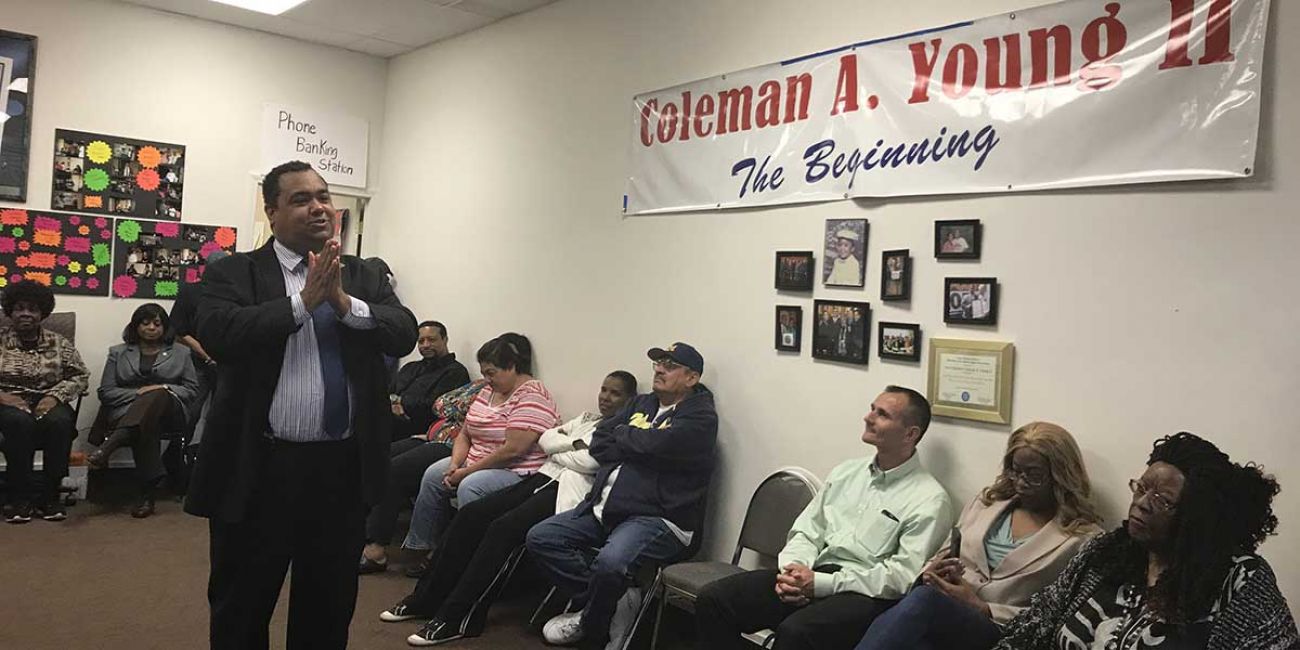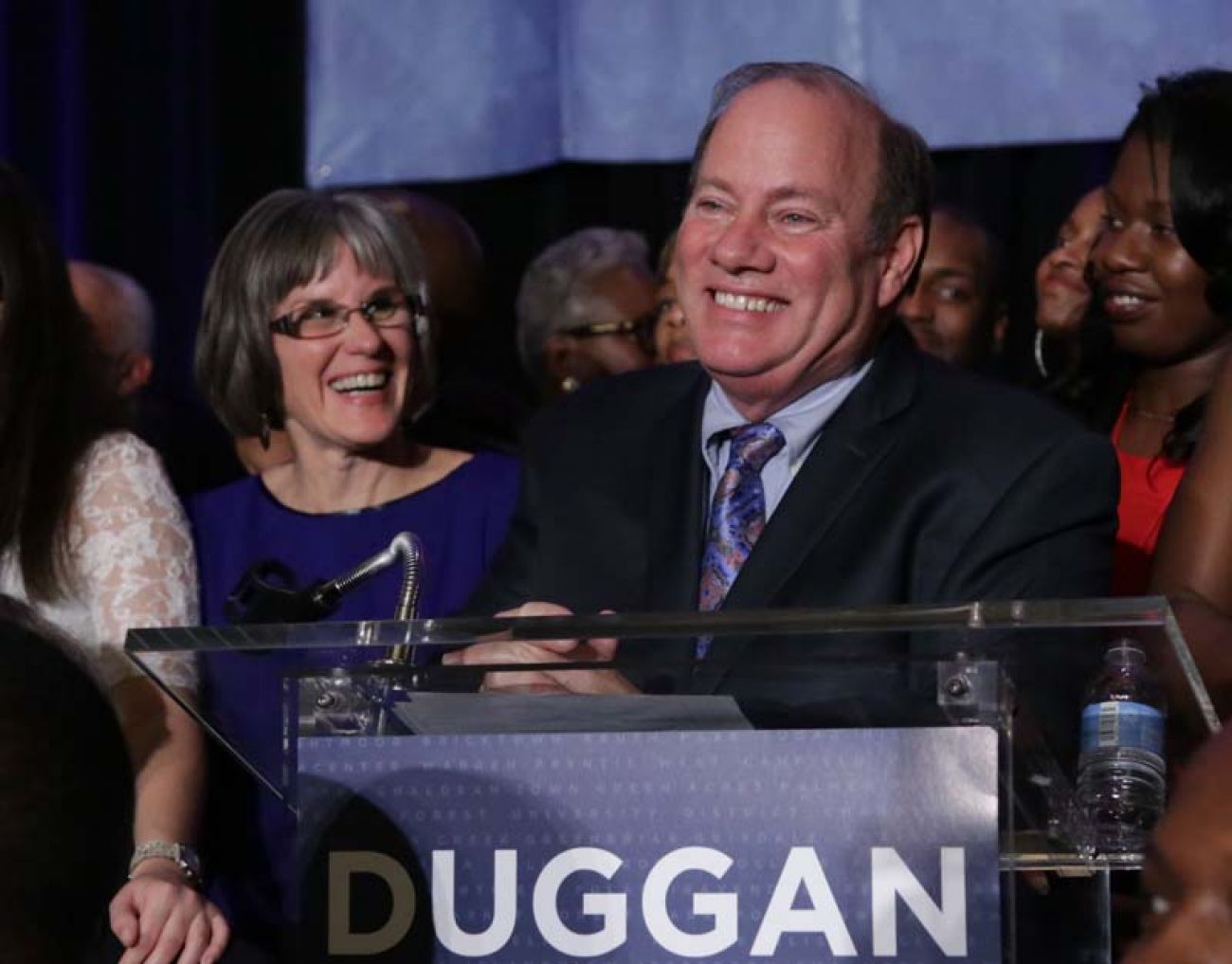Diary of a longshot: Inside Coleman Young’s no-frills bid for Detroit mayor.

The grilled chicken came on Styrofoam plates, while Detroit mayoral hopeful Coleman A. Young II worked the room and took photos with his supporters.
Decorations at Steve’s Soul Food Restaurant in downtown Detroit were limited to three silvery balloons in the shape of the letters “C,” “A” and “Y.” Later in the night, a ballroom dance contest was planned for the 80 attendees.
The cost of admission: A $20 donation to the campaign of Young, 34, a state senator who is in the final stretch of a long-shot bid for mayor against one-term incumbent Detroit Mike Duggan in the Nov. 7 election.
The next week, in contrast, a fundraiser for Duggan was scheduled at the Detroit Athletic Club. Tickets cost $100 to $1,000.
It’s been that sort of campaign for Young, the son of Detroit’s first black mayor, Coleman A. Young. The 10-year legislator may have a million-dollar name, but he’s run a shoestring campaign.
Since finishing 41 percentage points behind Duggan in the Aug. 8 nonpartisan primary, Young has raised little money. Instead, he relies on no- and low-cost events, such as talking to voters on public buses, attending events like high-school reunions and posting messages and videos on Facebook.
Local political consultants have written off Young, saying his campaign never gained traction after missing early, key endorsements. Experts say Young’s best hope is to use the campaign’s televised (and only) debate on Oct. 25, social media and his gift for speechifying to boost his reputation for a future run for another elected office.
Related: One promise Mike Duggan can’t keep?
But Detroit is a city that loves underdogs, one where Duggan won as a write-in candidate in 2013 to become the city’s first white mayor in 40 years. Young said his campaign gives voice to Detroit’s majority – the poor and people of color.
“We’re about what’s going on in the neighborhoods, we’re about reaching out to the least of these, the people who’ve been forgotten, neglected, abandoned,” Young said during the fundraiser at Steve’s.
“The people who have no water, people who’ve been arrested for not having auto insurance … that’s who we’re going to get to go out and vote.”
‘The other guy don’t care’
Young said he expects his visibility to increase in the next few weeks and said he should be able to raise enough money to buy a television ad.
He won’t discuss campaign finances, but reports released Aug. 28 show he raised $33,750 compared to $1.8 million for Duggan.
“We’re doing this to fight for people who can’t fight for themselves!” Young told volunteers during an event last month at his campaign headquarters in northwest Detroit.
“We need you to raise money, we need you to go out there and knock these doors, ... because it’s too important, it’s too vital, what we out here running for. ‘Cause the other guy don’t care about none of this stuff.”
As he wrapped up, the crowd boomed with chants of “Cole-man Young! Cole-man Young! Cole-man Young!”
He spoke near a huge portrait of his father, who died in 1997 when his son was 14.
Young’s campaign was dealt an early setback when groups that sided with his father endorsed Duggan, including two dozen former mayoral aides; unions such as AFSCME and a group representing 100 of the city’s pastors.

Perhaps the biggest symbolic blow came when Duggan received the endorsement from the Black Slate, the political organization affiliated with the Shrine of the Black Madonna, a powerful church on the city’s west side. The Black Slate was founded in 1973 and helped elect Young to the mayor’s seat that year.
If Coleman Young II wants to gain on Duggan, he needs to hone his message that Detroit’s comeback is limited to downtown and Midtown rather than the neighborhoods, said Detroit political consultant Steve Hood.
“Now it’s about the social media, creating a buzz, text messaging, massive debate prep for a knock-out punch a week before the election,” he said.
“He’s got to define Duggan, get under his skin.”
Hood said Young likely won’t win but could get as much as 40 percent of the vote. In the primary, Duggan received 68 percent of the vote to Young’s 27 percent.
‘The gift of gab’
Young’s best hope, Hood and others say, is to connect with voters who identify with the “two Detroits” narrative.
As Young sees it, investments in downtown and Midtown have diverted tax dollars from neighborhoods. It’s a new Detroit, Young says, where millions of tax dollars are used to build Little Caesars Arena for billionaire sports owners while water is disconnected at the homes of 83,000 poor people.
Related: Are there two Detroits? A new report says yes, but...
“He has the gift of gab. He is bringing voice to real issues of real people and residents’ concerns,” said Darci McConnell, president and CEO of McConnell Communications, Inc., a Detroit-based firm that often works on political campaigns but isn’t involved in this year’s mayoral race.
“The question is, is (Young) going to be able to connect with enough voters so they can hear that message and will he be able to get them to go out and vote?”
Young is a passionate, often funny orator who speaks about racial and progressive issues such as raising the minimum wage to $15 an hour. That could be a powerful message in a city with a median income of about $26,000, said McConnell, who predicts Young won’t win.
But some of the senator’s speeches have been more successful than others.
This month, a video went viral online of Young speaking on the state Senate floor following the death of Damon Grimes, a 15-year-old Detroiter who crashed his ATV and died after being Tasered by a state trooper. The YouTube clip has attracted more than 3 million views.
In late August, though, Young was criticized by local media for appearing in a YouTube rap video for the song “We Be Winning.” The video includes a speech from Young claiming “white supremacy” in the Manoogian Mansion, the city’s mayoral residence.
A muted message
This is Young’s second mayoral campaign. When he was 26, he finished a distant fifth in the primary that eventually elected Dave Bing to office.
Young has served two terms in the state House and is approaching his last year of his final Senate term because of term limits. A Democrat in a Legislature controlled by Republicans, he’s established a reputation as a reliable – if often losing – vote for progressive causes.
His biggest legislative victory, according to the Detroit News, came in 2009 when he sponsored a law barring discrimination against pregnant women.
Related: Promises, meet reality: Measuring Detroit Mayor Mike Duggan’s first term.
Young was an opponent of the so-called grand bargain that cleared the way for Detroit’s exit from bankruptcy but led to benefit cuts for pensioners. He also opposed the 2016 reorganization of Detroit Public Schools that restored the city’s elected school board but established a Financial Review Commission to monitor the district’s finances.
Prior to winning a seat in the Legislature at the age of 23, Young worked as an aide to former Detroit City Councilwoman JoAnn Watson. Before that, he went by his birth name, Joel Loving, and lived in California where he grew up. Young’s Senate biography indicated he attended Azusa Pacific University in California and transferred to Wayne State University, where he plans to complete his undergraduate degree.
His 10-page campaign platform, “Plan for Detroit,” promises to improve customer service, inclusion and transparency in city services; lower auto insurance rates and help entrepreneurship and education. The plan also proposes adding elevated, driverless two-person pods for transit and reviving the idea of an Africa Town commercial district.
Because he has little money, Young must spread his message door-to-door through volunteers, Hood said.
“If he was able to do two poll mailings and one to females, if he was actually able to buy ad space on (the music application) Pandora targeting anybody who downloaded or wanted a hip-hop channel, this would be a different race,” Hood said.
Young probably would’ve had a better shot at winning this year’s city council race against incumbent District 5 Councilwoman Mary Sheffield, a race he was rumored to have considered, Hood said.
Mario Morrow, president and CEO of Mario Morrow and Associates, a public relations firm in Detroit, said Young hasn’t crafted a public conversation to eclipse his relative youth and the fact that he lacks a recognized reputation apart from being his father’s son.
“It was too early for him to run,” Morrow said. “The timing was off.”
‘You have to know your people’
Young’s supporters feed on the naysayers.
At campaign events, they hang on Young’s words, pumping fists in the air.
Some support him because they dislike Duggan, pointing to an ongoing federal grand jury investigation of his signature program, the demolition of 12,000 blighted homes. The probe is believed to focus on the cost of contracts and the process to award them.
Other supporters consider Young an ally for the city’s black and brown poor majority.
“Mike Duggan has a cloud of controversy around him,” said Kim Traus Ewing, a Young supporter. “I think the issues (Young) addresses are relevant to me.”
At a campaign event last month, Young said too many people are being left out in Detroit.
“We got too many people making life decisions, ‘Am I going to pay my auto insurance or am I going to have lights?’ … What if we had a mayor who said, ‘I’m not going to support anything until more people in my community got jobs?’” Young thundered.
The choir of supporters responded with “I know that’s right!” and “Yes!”
Lory Parks, an organizer with the local Fight for $15 effort to increase the minimum wage and volunteer with the Young campaign, contended that small campaigns can win.
She recalled in 2003 when JoAnn Watson beat Gil Hill for an open city council seat, she did so with a strong grassroots campaign.
“Coleman A. Young goes directly into the neighborhoods, I have yet to see Duggan go anywhere except the Avenue of Fashion where he feels comfortable,” she said.
“You have to know your people.”
See what new members are saying about why they donated to Bridge Michigan:
- “In order for this information to be accurate and unbiased it must be underwritten by its readers, not by special interests.” - Larry S.
- “Not many other media sources report on the topics Bridge does.” - Susan B.
- “Your journalism is outstanding and rare these days.” - Mark S.
If you want to ensure the future of nonpartisan, nonprofit Michigan journalism, please become a member today. You, too, will be asked why you donated and maybe we'll feature your quote next time!

